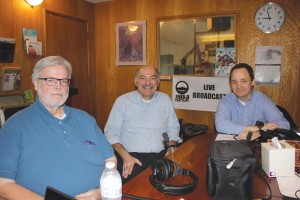
and Dean Justin Atkinson.
Photo: Missy Mckai Cartier
Anto Sakayan
Staff Writer
Professor Barlow Der Mugrdechian, Coordinator of Fresno State’s Armenian Studies Program, was interviewed on KFCF (88.1 FM) radio’s “Valley Views on the Law” on January 5, 2017. The interview, conducted by Justin Atkinson, Academic Dean of the San Joaquin College of Law and Jeffrey G. Purvis, Professor of Constitutional Law, addressed the importance of teaching about the Armenian Genocide in California public schools.
Der Mugrdechian was interviewed because of recent successes achieved by Armenian members of the California Assembly, who have worked diligently to introduce an Armenian Genocide Curriculum in California public schools.
The Curriculum provides school districts and teachers the opportunity to devote more time to teaching their students about the Genocide.
These recent efforts to expand the curriculum arose out of the signing of the Armenian Genocide Education Act (AB 1915) by Governor Jerry Brown in September of 2014. AB 1915 provides for the inclusion of Armenian Genocide eyewitness accounts and survivor testimonies in the teaching of Human Rights in California public schools.
It also encourages the development of resources for teachers to use when teaching the Armenian Genocide in their classes.
“The word Genocide itself was coined by Raphael Lemkin in the 1940’s,” said Professor Der Mugrdechian. Der Mugrdechian stated that in defining genocide, Lemkin was aware of the Armenian example, and brought it to the world’s attention so that the world powers would adopt policies that banned or prevented genocide.
Although Lemkin’s intentions were clear, Der Mugrdechian believes that the current issues in acknowledging the Armenian Genocide are related to the fact that the term Genocide is “both in the political arena as well as the legal arena.”
The interview also addressed how in recent years the modern Turkish Government called for a convening of a historical commission to assess whether the Armenian Genocide constituted in fact genocide.
“There is no doubt of the historical record,” said Der Mugrdechian. “When looking at the evidence found in the German and Austria-Hungarian archives (allies of Ottoman Turkish in World War I), one finds overwhelming evidence affirming the Genocide.”
Despite the evidence, the United States has yet to officially recognize the Armenian Genocide. When asked why this was the case, Der Mugrdechian responded that the government believes that it is not in the best interests of the United States to use the word “genocide,” because it would cause tension in relations between the United States and Turkey and potentially disrupt ties.
Despite the continued denial of the Turkish government, there has been significant progress made in the United States, especially in California, regarding educating public school students about the Genocide.
When talking about the passage of AB 1915, Professor Der Mugrdechian praised the hard work of California Assembly members in their continual push for including such a curriculum in the California schools.
“Genocide education is important because students should be informed about the past and students can learn from past genocides in order to prevent future ones,” stated Der Mugrdechian.
He added that the curriculum in public schools could include education on how survivors were able to overcome their trauma and how they were able to lead productive lives. An example of this would be the Central Valley’s Armenian population, which has been established for decades and has contributed greatly to the overall success of California.
The Armenian Genocide, which the Turkish Government continues to deny, has been officially recognized by over 20 nations, including a number of countries in South America and Europe.
With legislative action being taken to further educate students and teachers about the Armenian Genocide in California, there is increasing hope for a nationwide acceptance of the Genocide, something that Armenians have long been seeking.
For further information and resources on the Armenian Genocide, please visit https://www.facinghistory.org/resource-library?search=Armenian%20Genocide and https://genocideeducation.org/. Sources used in this article include: www.ancawr.org/CAGenocideEducation and http://www.mirrorspectator.com/2016/12/01/armenian-genocide-to-be-taught-in-california-schools/.
 Hye Sharzhoom Armenian Action
Hye Sharzhoom Armenian Action